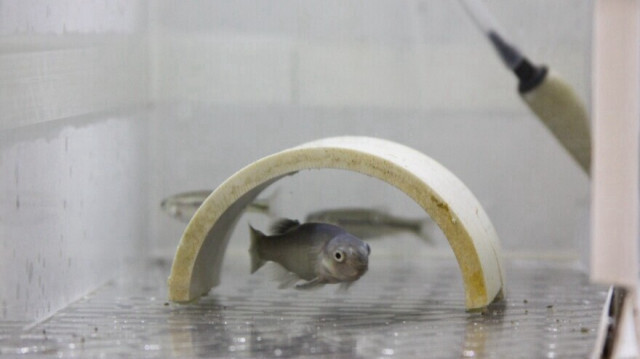
Microplastic particles were detected in fish brains during a scientific study conducted on aquatic creatures in Türkiye's eastern province of Erzurum.
Disposable plastics discarded in nature can turn into microplastic particles in water under the influence of waves, sun, and wind. These particles are then consumed by aquatic creatures and enter the human food chain.
Based on this situation, Professor Muhammed Atamanalp from the Faculty of Fisheries at Ataturk University in Erzurum has been working on aquatic creatures for two years with a team of seven people.
Scientists conducted research on 300 fish, 200 lobsters, and 150 freshwater mussels collected from different seas and water sources. They detected microplastic particles in the fish brains during detailed laboratory analyses.
Atamanalp told Anadolu that plastics are much more preferred by people due to their ease of use.
He stressed that these plastics pose serious environmental and human health risks due to irresponsible use, saying: “The intensive use of disposable materials due to their practicality and their irresponsible release into the environment cause them to reach water resources.
"After reaching water sources, these plastics, which are divided into particles that cannot even be seen by the eye due to sunlight, wind or wave movements, are mistaken for food by aquatic creatures in that environment and begin to be consumed and stored in their own bodies. We detected microplastic particles in fish brains for the first time in our studies. With the presence of these particles in the brain, we have shown that they are carried from the blood to other organs.”
Emphasizing that plastics harm humans, Atamanalp noted: “Particularly when hot drinks are placed in those disposable materials, microplastic particles that dissolve here can directly pass to humans. Secondly, the consumption of aquatic creatures that absorb them in other ways by human beings can pose a health risk to humans.
"We have detected the presence of these microplastics in lobster, mussels and different types of fish. I say mussels as a separate title. Due to their diet, mussels store these plastic particles in their tissues and pass them to people who consume them.”
- 'Consumers should not panic about fish'
Underlining that there is no need for panic among fish consumers, Atamanalp highlighted: “We have revealed in our studies that the accumulation of microplastics in muscle tissue consumed by humans is not at a level that will cause harm, but when we look at other organs, we detected serious amounts of microplastics, in particular in the liver and kidney.”
Pointing out that people's accelerating pace of life makes the use of disposable materials compulsory, he added: “Since there is an inevitable situation from their use, we say that at least let's not leave them in the environment when they appear as waste. Let's especially include them in the recycling system.
"If we act with this awareness, we will protect our environment, our water resources, the aquatic creatures in it and ultimately human health. What is meant by single use is that you do not have to wash and reuse it again. They surely bring a lot of benefits in terms of use and practicality. However, when we consider the environmental burden, unfortunately, they give rise to serious problems,” he noted.
*Writing by Serdar Dincel from Istanbul














